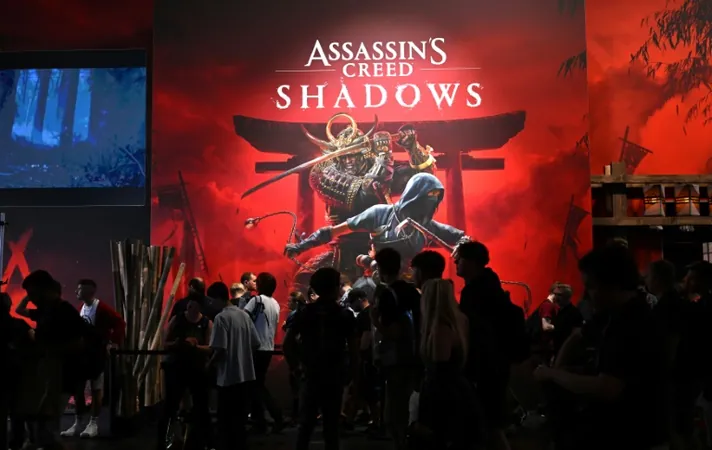
Controversy Erupts Over Black Samurai in Assassin's Creed: Shadows
2025-03-18
Author: Rajesh
Introduction
The much-anticipated latest installment of the popular video game series "Assassin's Creed," titled "Shadows," has sparked intense debates over its historic portrayal of characters, particularly due to the inclusion of a black samurai, Yasuke, as one of its protagonists. Set in 16th-century feudal Japan, the game showcases stunning recreations of the era, including majestic fortified cities and serene temples, lauded by historians for their attention to detail.
Historical Representation
Pierre-Francois Souyri, a historian who consulted on the project, highlighted that his team's efforts sought to eliminate clichés and ensure a more authentic representation of Japanese history. He noted that he fielded "a hundred or more questions" from the developers, covering topics from salt production to traditional puppet shows, ensuring that the game isn’t just thrilling but historically informative.
Criticism and Controversy
Yet, the choice of a black character in a samurai role has raised eyebrows and ignited a petition in Japan that gathered over 100,000 signatures, criticizing the developers for perceived historical inaccuracies and a lack of cultural respect. Critics argue that while Yasuke did exist, there are nuances to his status that complicate his portrayal as a samurai. Yuichi Gozai, a medieval history expert, asserted that there’s no definitive proof that Yasuke met the qualifications for samurai status, suggesting he was more of an exotic curiosity for his patron, warlord Oda Nobunaga, rather than a traditional warrior.
Online Backlash
The backlash erupted well ahead of the game's release and represents one of the most heated controversies surrounding "Assassin's Creed." In the past, the series has faced criticism for its portrayals of historical figures, such as the contentious depiction of revolutionary leader Maximilien Robespierre in "Assassin's Creed Unity."
Cultural Impact
A report from the European Video Game Observatory indicated that the announcement of Yasuke’s character triggered a fierce online reaction, which it attributed to a coordinated effort by a small group of American conservative voices. This group, comprising only 0.8% of the conversation participants but generating over 22% of related media coverage, was seen as part of a broader culture war influenced by current political climates, particularly during the ongoing U.S. presidential campaign.
Developer's Perspective
Marc-Alexis Cote, executive producer of the "Assassin's Creed" franchise, expressed that while Yasuke's character had been manipulated by certain factions to push their narratives, the game's intent was purely a creative exploration of history. However, the sensitivity surrounding historical depictions in Japan suggests a need for careful consideration of how cultural heritage is treated in entertainment.
Market Dynamics
Ubisoft's hesitance to develop a game set in Japan has shifted, likely influenced by the commercial successes of previous titles rooted in Japanese feudalism, such as "Sekiro" and "Ghost of Tsushima." Historian Souyri pointed out that Western fascinations with Japanese culture, fueled by manga and anime, have contributed to the demand for such games. Yet, Gozai cautioned that oversimplified and glorified portrayals might inadvertently exacerbate stereotypes and discrimination against Japan.
Conclusion
In conclusion, the "Assassin's Creed: Shadows" controversy serves as a stark reminder of the complexities in balancing creative storytelling with historical fidelity, as well as the broader ramifications it can have on cultural perceptions. Will this game succeed in forging a respectful dialogue about history, or will it deepen divisions over cultural representation? Only time will tell.


 Brasil (PT)
Brasil (PT)
 Canada (EN)
Canada (EN)
 Chile (ES)
Chile (ES)
 Česko (CS)
Česko (CS)
 대한민국 (KO)
대한민국 (KO)
 España (ES)
España (ES)
 France (FR)
France (FR)
 Hong Kong (EN)
Hong Kong (EN)
 Italia (IT)
Italia (IT)
 日本 (JA)
日本 (JA)
 Magyarország (HU)
Magyarország (HU)
 Norge (NO)
Norge (NO)
 Polska (PL)
Polska (PL)
 Schweiz (DE)
Schweiz (DE)
 Singapore (EN)
Singapore (EN)
 Sverige (SV)
Sverige (SV)
 Suomi (FI)
Suomi (FI)
 Türkiye (TR)
Türkiye (TR)
 الإمارات العربية المتحدة (AR)
الإمارات العربية المتحدة (AR)